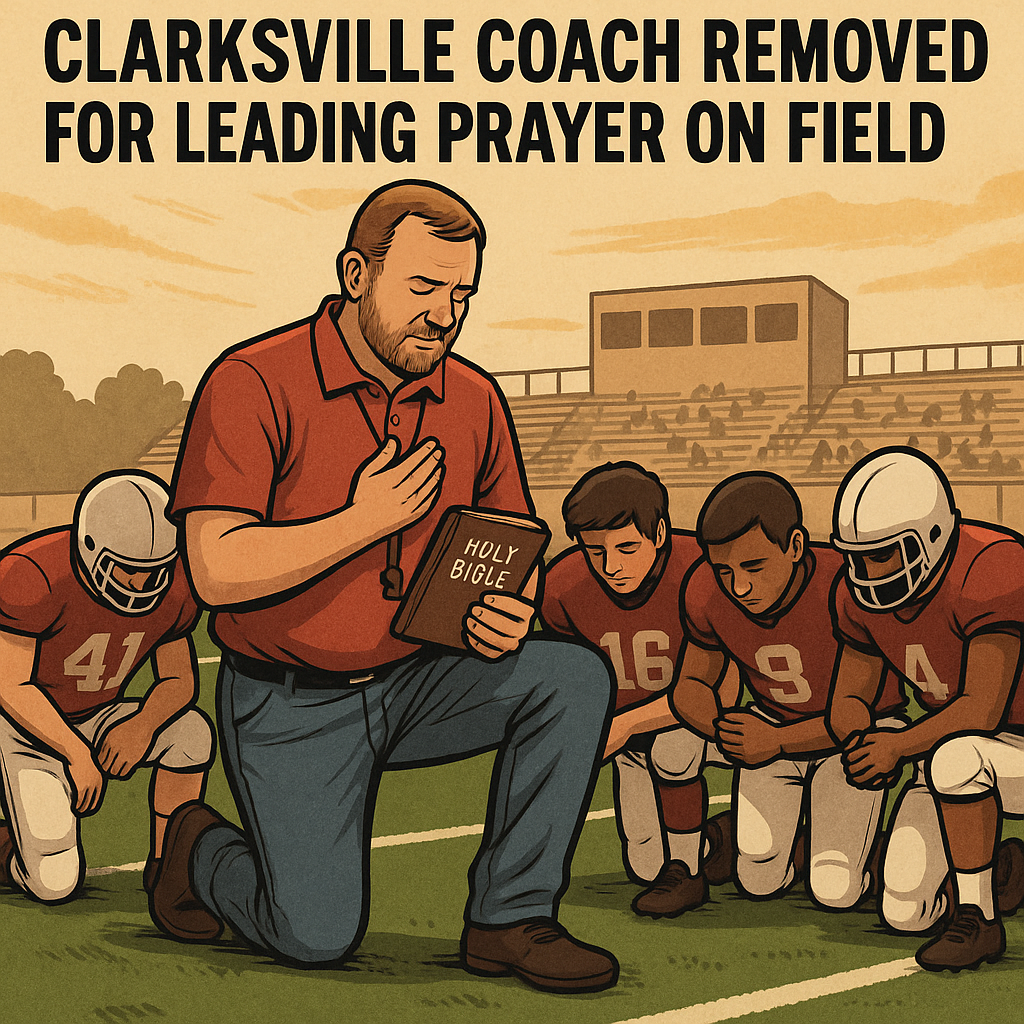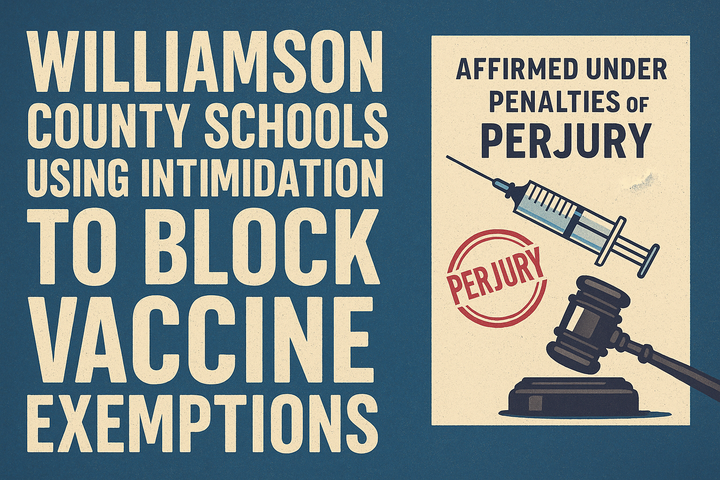A Clarksville volunteer coach was removed for leading prayer on the field, sparking debate over faith, free speech, and Tennessee’s Christian identity.
CLARKSVILLE, Tenn. — A firestorm has erupted in Montgomery County after Trey Campbell, a volunteer assistant football coach at Northwest High School and the school’s Student Resource Officer (SRO), was removed from his coaching duties for bringing a Bible to a game and leading players in prayer.
For many parents, students, and community members, the decision raises a larger question: does a coach, even one connected to the school as an SRO, forfeit his First Amendment right to pray when standing on the sidelines of a football game?
A Controversy Rooted in Faith and Freedom
Campbell, like countless coaches across the country, took a moment to pray with his players before a game — something that has long been a tradition in American sports. Yet his dismissal reflects the ongoing tension between public education and religious expression.
Supporters of Campbell argue that his dual role — as both a volunteer coach and a school resource officer — does not strip him of his rights as a citizen. Whether coaching or patrolling the hallways, they contend, he retains the freedom to express his faith, particularly in a setting where participation was voluntary.
The decision comes at a time when prayer in schools is again a national conversation, with former President Donald Trump recently announcing that the Department of Education will issue new guidance protecting prayer in public schools. It also echoes a landmark 2022 U.S. Supreme Court case, Kennedy v. Bremerton School District, where justices ruled 6-3 that a high school football coach had a constitutional right to pray on the field after games. The Court found the coach was acting as a private citizen and not in his official capacity, affirming that personal religious expression is protected under the First Amendment.
“Separation of Church and State” Misunderstood
Much of the controversy stems from repeated references to the phrase “separation of church and state.” Critics of Campbell’s prayer suggest that allowing it would violate this supposed constitutional principle. But the phrase itself does not appear anywhere in the U.S. Constitution.
Instead, it comes from an 1802 letter written by Thomas Jefferson to the Danbury Baptist Association. In that letter, Jefferson used the metaphor of a “wall of separation” to reassure Baptists that the government would not interfere in their religious practice. The First Amendment, in fact, prohibits Congress from establishing a state religion while also guaranteeing the free exercise of faith.
Over time, Jefferson’s metaphor has been used — and misused — in debates over public expressions of faith. The Constitution guarantees freedom of religion, not freedom from religion. The distinction matters, particularly in cases like Campbell’s, where no student was compelled to participate, and the coach’s actions reflected personal conviction rather than official school policy.
Tennessee’s Identity and Tradition
This debate also strikes a deeper cultural chord because of where it is unfolding. Tennessee is not Washington state, California, or New York. It is a state where nearly 70 percent of residents self-identify as conservative Christians. People move here from blue states in part because they want to live in a community where prayer at a public high school football game is not unusual but expected. It’s part of Tennessee’s identity, part of what sets the state apart from places where such traditions have been litigated and largely erased.
When a volunteer coach is disciplined for bowing his head with his team, many Tennesseans see it as more than a personnel decision — they see it as an assault on a way of life that drew them here in the first place.
The District’s Response
The Clarksville-Montgomery County School System (CMCSS) issued a statement acknowledging the incident but declined to give details until its investigation is complete. “It’s my understanding that the concern was not with private prayer, but that the principal received a concern that an employee was proselytizing in their official capacity,” the district said. “We will investigate, and I can share more when that investigation has concluded.”
The district further expressed disappointment that local media reported on the issue before reaching out for comment, saying early coverage presented only one side of the story.
Still, many in the community are unconvinced by the district’s framing. Campbell’s prayer, they argue, was no more than a voluntary act of devotion. For the school to interpret it as “proselytizing” reflects a misunderstanding of both the facts on the ground and the broader constitutional protections affirmed by the Supreme Court.
A Larger National Struggle
At its core, this controversy in Clarksville is part of a much broader national debate. Opponents of public prayer argue that even voluntary displays create a sense of pressure on students to participate. Supporters counter that prohibiting prayer outright silences individuals who wish to live out their faith in public life — something the Founders never intended.
The stakes are not small. If Campbell can be removed for bringing a Bible to the field and leading a prayer, what does that mean for teachers who bow their heads quietly over lunch, or for students who gather around the flagpole to pray before school?
For generations, prayer has been a part of the fabric of American life, from the halls of Congress to the locker rooms of small-town football teams. The Constitution was written to protect that freedom, not erase it.
The Bottom Line
Coach Trey Campbell’s removal may appear to be a local personnel decision, but it touches on fundamental questions about liberty, faith, and the role of religion in public life. As a volunteer coach and school SRO, Campbell does not lose his First Amendment rights when he steps onto a football field.
The Supreme Court has already made clear that private religious expression, even by public employees, is protected under the Constitution. The phrase “separation of church and state” — so often cited to silence prayer — is not a constitutional command, but a historical metaphor reminding us that government should not interfere with the free exercise of faith.
What happened in Clarksville is about more than a single Bible and a single prayer. It is about whether Americans still believe in the right to live out their faith publicly, freely, and without fear of punishment — even under the Friday night lights.
If you support what we do, please consider donating a gift in order to sustain free, independent, and TRULY CONSERVATIVE media that is focused on Middle Tennessee and BEYOND!



Comments ()